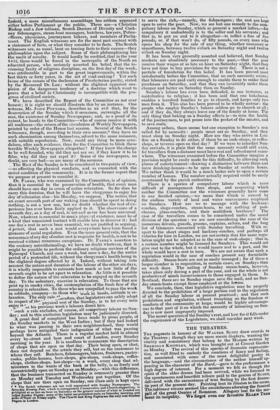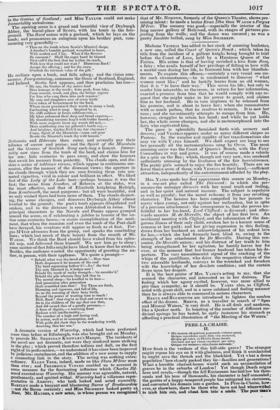THE THEATRES.
THE pageants in honour of Sir WALTER SCOTT draw crowds to the Theatres ; though they are mere scenic displays, wanting the vitality and consistency that belong to the Masque written by SHERIDAN KNOWLES, which was brought out at Covent Garden on Monday. The revival of this species of dramatic representa- tion, so well fitted to embody the creations of fancy and feeling, and associated with some of the most delightful poetry in the language,—and the circumstance of the author himself ap- pearing in the character of the Bard,—gave to the performance a high degree of interest. For a moment we felt as though the spirit of the elder drama had been revived, while we listened to the spontaneous and heartfelt tribute paid to the genius of SCOTT, delivered with the earnestness of true feeling by the first drama- tic poet of the present day. Painting lent its illusion to the scene. Thefableaux vivans seemed like iscuteheons adorning the funeral 011.0, the great Genius of ,Romance. Allegory lost for the mo- inent its insipidity. Wit forgot even our favourite FALLS* TEES in the Genius of Scotland; and Miss TAYLOR could not make Inzmortality unwelcome. • The opening scene is a grand and beautiful -view of Dryburgh Abbey, the burial-place of SCOTT, with his tomb in the fore- ground. The Bard enters with a garland, which he lays on the tomb; and pronounces an eulogium upon his brother poet, com- mencing very gracefully- " Thus on the tomb where Scotia's Minstrel sleeps,
A brother's humble garland, wreathed in haste, With modest zeal I lay. What if the flowers Be common? Shall the eager hand be blamed That cull'd the first that lay within its reach, With love that could not wait ? Illustrious Bard !
Accept the offering ; and for the cause O'erlook the intrinsic value of the gift."
Ile reclines upon a bank, and falls asleep; and the vision com- mences. Fancy entering, summons the Genii of Scotland, England, and Ireland. Scotia first appears, and thus proclaims her loss— "lily son, the Genius of thy native land
Does homage at thy tomb ; froth peak, from lake, From torrent, wood, and glen, she brings regrets For him who sang them into such renown !
My sons and daughters now of every birth' Give token of bereavement for the bard, Whose strain proclaini'd their worth to many a land, Enchanting what it sang. Inspired by it,
My cliffs sublime in forms sublimer rose,— My lakes enhanced their deep and broad expanse,—
lily thundering torrents leap'd with bolder bound,—
With more majestic brow my woods did nod,— More maddening rose my pibroch's battle cry,—
And brighter, thicker flash'd my fair claymore! Come, Spirit of the Mountain—come and pour Beside the Minstrel's tomb thy wild lament."
Britannia and Hibernia then enter, and severally pay their tributes of sorrow and praise; and. the Spirit of the Mountain and the Genius of Scottish Song each sing a lament. Immor- tality now rises from the tomb of the bard, and claims him for her son; bids centuries to pass away, and show the honours that await his memory from posterity. The clouds open, and dis- close a series of tableaux vivans, which appear in continuous suc- cession, after the manner of the dioramic views; the aperture in the clouds through which they are seen forming them into ani- mated vignettes, vivid in colour and brilliant in effect. We liked that of the Lady of the Luke best—perhaps because it was the first; the scene from Ivanhoe, of Rebecca at the stake, was the most effective, and that of Elizabeth knighting Raleigh, from Kenilworth, the most gorgeous: but all were beautiful, and we only wished there had been more of them. The clouds dispart- ing, the scene changes, and discovers Dryburgh Abbey almost levelled to the ground; the poet's tomb appears dilapidated and sunken, and in the distance is seen Abbotsford in ruins. The principal characters in the Novels and Poems appear grouped. around the scene, as if celebrating a jubilee in honour of the au- thor some centuries hence,—a scenic exemplification of the senti- ment, that when the mansion and even the tomb of the Poet shall have decayed, his creations will appear as fresh as at first. Fer- gus M`Ivor advances from the group, and speaks the concluding lines; which lost much of their beauty from the mouth of Mr. 1VARDE. We think the Bard should have waked from his splen- did nap, and delivered them himself'. We saw him go to sleep ; some matter-of-fact folks might have liked to know that he awakes. Besides, the audience wanted the opportunity of greeting the au- thor, in person, with their applause. 'We quote a passage- " Behold what was thy loved abode !—How time
Bath dispossess'd its tenants of the roof Thy brief sojourning hallow'd !—Lo ! the bird i The only Minstrel s, it lodges now ! Behold thy tomb of rocky strength—'tis moulder'd ! Behold the pile wherein they laid thee in
Thy mortal sleep—'tis levelled to its base—
And generation after generation Bath crumbled into dust ! Yet These are fresh, Blooming and vigorous, and full of life, As on the morning of their lusty birth, • Beyond the power of wasting time to touch ! Hail, Bard ! that sing'st as loud and sweet to us, • As to the children of the age that saw thee, • And did record thee of a goodly prence,— A form of dignity—a towering front Radiant with intellectuality,— The voucher of a high and daring soul, In action, well as in conception, and With pride did show thee to the wondering world, Asserting thee her son."
A dramatic version of Waverley, which had been performed some time before at Edinburgh, was also brought out on Monday, to precede Mr. SHERIDAN KNONVLES'S Masque. The incidents of the novel are not dramatic, nor were they rendered more striking in the play ; which proved therefore tedious and dull, on the first night of its performance,—we understand it has since been improved by judicious curtailment, and the addition of a new scene to supply. a connecting link in the story. The acting was nothing extra- ordinary. ELLEN TREE, indeed, made Ili like 'Flora PrIvor more than .ever; and FREDERICK VINING enabled us to account in tame measure for the fascinating influence which Charles
Eli-
Ward exerted over Waverley. His manner. was agreeable, natural, gentlemanly, and spirited withal. Wavirley had a villanous repre- sentative in ABBOTT; who both looked and acted execrably. BARTLEY IIIRde a buoyant and blustering Baron of Bradwardine, net the Baron. certainly ; and Miss SHIRREFF looked pretty ak Rose, Mr. HAINES, a new actO4 in whose person we -recognized" that of Mr. NORTON, formerly of the Queen's Theatre, shows pro mising talent: he made a better Evan Dhu than WARDE a Fergua M`Ivor. The scenery was good,—especially the interior of the long narrow gallery of Holyrood, with its ranges of pictures pro- jecting from the walls; and the dance was encored ; as was a pretty Jacobite ballad, sung by Miss SHIRREFF.



























 Previous page
Previous page